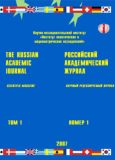О журнале
The Russian Academic Journal is one of the fundamental scientific publications on the territory of South of Russia, Greater Caucasus, Central Asia, Ukraine and Indochina, which are conducting an important mission on spreading in the international academic community works of Russian, Ukrainian, Caucasian and Asian scientists relating to regional range of problems; annually this journal publishes more than 120 scientific articles in Russian and English languages concerned with economy, management, political science, philosophy, philology, mathematics, informatics, chemistry, biology, geosciences. Authors of these articles are famous scientists from China, Ukraine, the USA, India, Afghanistan, Great Britain, Russia and other countries. Members of editorial team of the journal are working in three continents: Europe, North America and Asia, in six countries: Russia, Ukraine, India, Great Britain, the USA and Afghanistan.
In accordance with the resolution of the members of the editorial board, which has been drawn up on the meeting in the George Washington University (Washington, DC), starting January, 2014, the regional subjects make the domain of problems of the Russian Academic Journal. By general repute of the editorial board members, the international community fairly well understood any global processes, but as regards local, especially regional processes, there are considerable gaps. So, international members of the editorial board of the Russian Academic Journal are waiting from their authors any qualitative actual data relating to processes and events in their regions which are unavailable in any other scientific publications or in the Internet.
The general partner of the Russian Academic Journal is the Southern University (IMBL) (Russia, Rostov-on-Don). Publisher of the journal is the Research Institute “Institute for Political and Media Metric Research” with its DOI prefix (10.15535).
In the journal the main scientific results of theses on competition of a scientific degree of the doctor of science can be published. The journal is included in the Russian Index of Scientific Citing (RISC) of National electronic library of the Russian Federation, InfoBaseIndex, GoogleScholar, OCLC WorldCat, ROAR, BASE, OpenDOAR, RePEc, JournalTOCs, OAJI, ISI (UAE), DOAJ, Fedora (DURA SPACE), CrossRef, PORTICO, Ulrich`s (ProQuest), Exlibris, Socionet and funds of Library of the Congress of the United States of America.
The Russian Academic Journal represents a new generation of academic journals acting on the grounds of the principle of open access. As the scientific articles should be maximally wide spread, the Russian Academic Journal does not apply the copyright law for to restrict access and use of published material. On the contrary, the copyright law and any other legal instruments are applying for to achieve a continuous open access of journal audience to all articles published by the journal.
On its site the Russian Academic Journal uses a Canadian IT technologies development– the all-powerful content management system in the Internet, integrated into the Library System for North America and in the Index system of North American Universities – Open Journal System (OJS). Switch of the journal at a totally new level made it possible to enter into several international databases of scientific citing.
The Russian Academic Journal is one of those few journals in the south regions of Russia, which is assigning to each article of each author the international identifier of scientific article, DOI.
For to publish any scientific articles in the journal it is necessary to be registered as an author on the site of the journal and to get in contact with the executive editor of the journal:
E-mail: chief@wolfcorner.org
Научная область
Volume 27, issue 1
Содержание
The aim of our research is to find ways to improve the quality of training, including by improving the resource potential of this sector. The significance of education is in the socio-economic life of the country and its growth in the face of globalization, the essence, the state of the resource....
The article is devoted to working-out of new technique to measure demographic development of the macroregions. On this article are proposed new<br />statistical exact indicators of demographical development. There are also provided some graphics of measure of geographical development....
The assumptions of the youth of Kabardino-Balkaria about what has caused the spread of terrorism in the North Caucasus, what are the extremists’<br />goals and motivations are deduced from the analysis results of the sociological survey. The paper investigates the interrelation of the....
Language of kalmyk people, small ethnic group speaking one of the Mongolic Language buddhists living in the south of the Russian Federation,<br />in the lower reaches of Volga, is under the threat of disappearance. The main reasons for the loss of its communicative functions are:....
The article investigated the activities of international organizations in terms of their impact on the cultural heritage preservation in CIS countries.<br />The author analyzes historical context of the formation of common international system for the protection of cultural heritage, as....
China is immediate neighbour of Central Asian States and has very long history of engagement with the region. A brief history of Chinese engagement<br />is discussed in given paper. China is world largest economy and dependent of imported oil and gas form different part of world and this....
Until recently concept «spirituality» was used in various interpretations in relation to social group — intelligentsia or to the institute of<br />church which has saved for this purpose a lot of religious heritage experience. It is necessary to recognize that appeals to spirituality....




